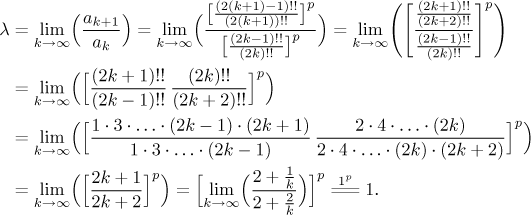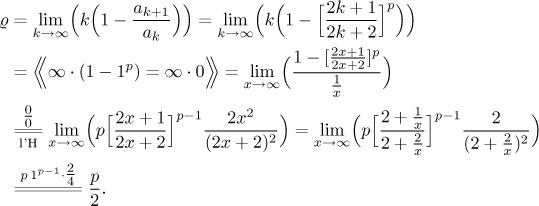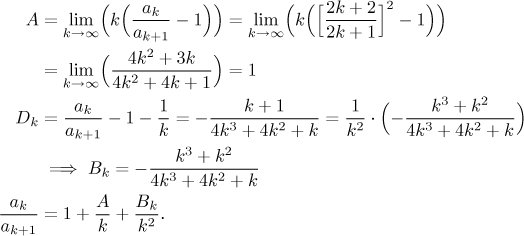Problem: Determine whether the following series converges.
![]()
Solution: The terms of this series are all positive, so we can use all those nice tests. But which of them will work? Since the terms feature factorials, the obvious choice is the Ratio test. But perhaps first it is a good idea to have a closer look at the terms to see how they behave (recall the definition of the double factorial in Functions - Theory - Elementary functions).
![]()
Since the last small fraction is about 1 for large k but it is always smaller than 1, it is not clear how the whole big fraction behaves, in particular whether it goes to 0. We try the Ratio test and see what happens, as usual we will put together parts with common origin.

This is the indecisive value for the Root test and we do not know anything about the series yet.
What other options are there? We cannot integrate factorials, so the
Integral test is out. Taking k-th root of factorials is also not wise
and by the above result we know that we would get
If we want to succeed we have to reach deeper into our vaults, namely in the section More tests in Theory - Testing convergence we had some tests that refine the Ratio test, tests that can (sometimes) help when the Ratio test comes up inconclusive. We start with the simplest of them, the limit version of Raabe's test.

By the Raabe test, the given series converges if
The case

We see that
![]()
Using the
Limit comparison test we easily
show that the series with terms vk converges by
comparing it to the
p-series
with

Thus we succeeded in setting up the "most general version" of Raabe's test,
we have
Conclusion: The given series converges exactly if
Remark: While the first step was quite straightforward, deciding the

We succeeded to set up the situation as required in the Gauss test, note
that Bk form a bounded sequence and